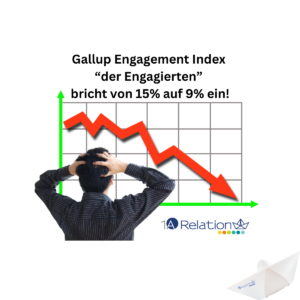Are there providers that offer ERP and CRM systems from a single source?
ERP CRM software: Small and medium-sized enterprises (SMEs) usually face a particular challenge when purchasing software:
A classic business usually has an ERP system. When a company’s activities in the areas of marketing, sales and service increase significantly, the question arises: Do you need an additional CRM system for customer relationship management? Or is the CRM module of the ERP system sufficient? What requirements do users have of the CRM system? How good are the CRM functionalities in the integrated solution? Is there an appropriate module for all requirements?
Every company faces this question at some point.
Larger companies usually choose the “best-of-breed” approach. This means selecting the specialist providers for the ERP system and CRM when setting up an IT landscape. A small company does not usually have the resources to support more than the ERP system. The IT department, with just a few people, is too small to master all user requirements in detail. Different providers and products have to be trained and supported in detail. The management tries to avoid this effort.
Excursus: What do the two abbreviations ERP system and CRM system stand for? ERP stands for Enterprise Resource Planning.
According to Wikipedia, “Enterprise resource planning (ERP) refers to the entrepreneurial task of planning, controlling and managing resources such as capital, personnel, operating resources, materials and information and communication technology in a timely and needs-based manner in line with the company’s purpose. The aim is to ensure an efficient operational value creation process and continuously optimized control of business and operational processes.” (as of 26.05.2020)
CRM stands for Customer Relationship Management.
According to Wikipedia, “Customer relationship management, or CRM for short, refers to the consistent focus of a company on its customers and the systematic organization of customer relationship processes.
The associated documentation and management of customer relationships is an important building block and enables in-depth relationship marketing. In many industries (e.g. telecommunications, mail order, service companies), relationships between companies and customers are long-term. CRM is used to maintain these customer relationships, which should have a significant impact on the company’s success.” (as of 26.05.2020)
Here are two videos (Video 1 and Video 2) that explain the benefits and functions of an ERP solution. (as of 26.05.2020)
The market leader in the field of business software SAP from Walldorf describes this on its own website as follows. (as of 26.05.2020)
The difference between ERP software and CRM software is as follows:
The ERP system has a very internal effect, the CRM solution has an external effect. And if both harmonize well with each other, then this is excellent for the company and its added value. Because then we are talking about seamless or uninterrupted processes and workflows. This is felt by the internal customer, i.e. the colleagues. And the interested party or external customer notices this when it comes to quotations, negotiations, calculations or contract management.
What does a company use ERP software for?
In traditional business, companies – usually manufacturing companies – use ERP software to handle internal value creation processes. The usual core functionalities are
- Material requirements planning
- production planning
- warehouse management
- Product information
- Personnel management
- Financial controlling, accounting and bookkeeping
- Project and investment management
- and, depending on the provider and industry, additional modules and
- the connection (interfaces) to other systems
What are the advantages of an ERP software solution with CRM functions?
The ERP software combines a common database with the CRM software. This uniform database avoids unnecessary interfaces. Data is exchanged smoothly. The ERP system is enhanced by CRM functions. The company can work and control holistically from Customer Relationship Management in combination with Enterprise Resource Planning. Employees can work together much more easily on this data and function basis. This makes the difference in the market. It creates a USP, the company’s unique selling point.
What modules and functions are needed specifically for CRM?
Let’s start with the most important: address and data quality:
These functionalities are often very weak in ERP software. a) The mapping of a wide variety of branch or subsidiary models as well as group management. b) The networking of a contact person with their various roles. e.g. Is the managing director also a lecturer or professor at the university and does he sit on a committee in the branch association? This networking often poses challenges for CRM software. c) Another test criterion is the issue of address and duplicate matching. How well and simply is this process supported?
Marketing campaigns and marketing automation:
Is email marketing software integrated? Is this third-party provider also efficient or does it only have an alibi function? Can the marketing department run different campaigns? Can the leads that are acquired be evaluated with a score? At what score is the sales employee sent this lead for final processing?
Mobile apps are currently booming. Whether in sales or technical service, mobile CRM has been a hot topic for years. Start-ups in particular have specialized in mobile applications and manufacturers are happy to access their knowledge.
We have implemented ERP and CRM projects for many companies. For the topic of CRM requirements, we have listed the criteria that should be used for evaluation and comparison.
Of course, there are many other customer management additions to business software. Whether as add-ons or apps from the manufacturer’s app world. The variety is growing all the time.
What other modules and functions are needed in addition to the CRM system and ERP system?
For a larger solution, modules and functions such as business intelligence (BI), e-commerce, e-business or online store, content management systems (CMS), workflow management and process design are very often in demand. These are usually docked onto the ERP software. Sales, marketing or e-commerce departments then use this information via their processes or for campaign management.
The business controversy: What is the leading system? ERP system or CRM solution?
The mother of all questions on this topic: What is the leading system? The ERP system or the CRM system? Many say it’s the ERP programs. What do you say? The question is usually answered with a compromise: The CRM system is the leading system for addresses and customers. The ERP leads in the area of inquiries and orders. In principle, this division is also correct. Only a modern ERP system works with a CRM system or the CRM supports the ERP system accordingly within the workflows. Example: A sensor in a machine measures the wear of a consumable. The ERP receives this measurement in real time. The CRM system then receives a message when the wear leads to a reorder being triggered. An employee in the CRM tool receives the order on the screen and can release it.
If the sensor reports “machine failure”, the service technician can be informed immediately to analyze the failure and the machine can be repaired immediately. In this way, both software systems work together perfectly. CRM software supplements ERP software with precisely those functionalities for which ERP software is not designed.
Both are needed to manage a company. That’s why collaboration is so important. A Collaboration of systems, but also of cross-departmental processes. CRM data is needed in the modules of the ERP programs and vice versa. Preferably without cost-intensive and time-consuming interfaces.
The myth of the standard in the enterprise resource planning system and the problem of individualization?
The argument of software manufacturers is very often: Take our product, because we have already defined the standards in such a way that you, the buyer, hardly have to adapt anything. However, this needs to be examined very carefully depending on the business. Just because company A comes from the same industry as you does not guarantee that company B has the same processes and value chains. So keep your eyes open and research information before making a long-term, usually very expensive decision. ERP systems and CRM systems are installed for at least 5 years, more likely up to 10 years. Today, as the vast majority of systems are only offered from the cloud, the lease runs for a correspondingly long time. A short-term exit from an ERP solution that has just been installed is rare and usually expensive.
Users should therefore not look for a solution to the problem afterwards, but should evaluate and compare in detail beforehand.
Is there the best ERP system? And also combined with a CRM system?
No, the answer to this question is clearly NO. There is no such thing as the best solution as a general answer. Every company has its own particularities and special framework conditions. This makes it difficult to say what is the best fit. As already described above. ERP providers like to talk about standards. However, these do not usually exist. This is because every company tries to establish its business model, its offering and its services in such a way that a USP is created. And a USP is not created with a standard that your industry colleagues also offer. Differentiation is required. And this differentiation is either supported by the software or even achieved through individual programming (customizing).
The usual suspects ERP software and CRM providers?
Who doesn’t know them, the usual suspects? SAP and Microsoft (Microsoft Dynamics NAV, Microsoft Dynamics AX or formerly Axapta and Navision) are both manufacturers of software solutions in this context. Both claim to have the best solutions for ERP CRM software. In our opinion, this is not always true. There are companies that opt for the integrated solutions from one of the two providers. And they realize, however, that integration looks different in theory and in practice. The wind is currently blowing in SAP’s customers’ faces (as of May 2020).
What is the demand for ERP (enterprise resource planning software) and customer relationship management solutions?
The market for ERP software is a very stable market. It lives from replacement procurement. This means that the market has hardly any growth. The current growth is due to the fact that many companies are switching from on-premise to cloud solutions. This switch or migration needs to be carefully considered. Many companies are therefore considering whether to put their ERP solution in the cloud first. And only then do they venture to install the CRM solution.
Combined solutions are usually the better solution for SMEs.
Seamless collaboration between the systems is a competitive advantage for every company, and smaller companies in particular benefit from this. So if you are faced with the investment decision to purchase an ERP system or a CRM system, check whether it is worth choosing a manufacturer that offers both systems in an integrated form.
As a company, this solution also has the advantage that there is only one contractual partner and usually only one service provider. These are all arguments in favor of an integrated solution. In addition to SAP and Microsoft Dynamics, there are also many other solution providers that we have listed in our Landscape.
Buy or rent? On-premise or cloud? Or open source?
Are these several complex questions? Recently, hardly any licenses have been offered for sale. Software providers are switching to rental contracts more or less quickly, as customers allow. This is very profitable for the provider, as they have a “recurring revenue”, just as publishers know it from subscriptions. This has long been common practice with CRM software. The ERP market is slowly following suit. On-premise ERP is therefore slowly becoming obsolete.
Companies still prefer the on-premise solution and are afraid to move their CRM and ERP solution to the cloud. Reason: data protection and security. Only quite frankly: In most cases, the security level of an external data center is significantly higher than that of your own data center. It’s more about the feeling of security. This can be solved quite well through contracts, audits and data protection officers.
Ergo: Cloud ERP providers are on the rise.
According to a Blissfully study, the market for software-as-a-service is growing enormously.
Whether open source solutions play an important role: The CRM application has been around for years as open source. In the CRM and ERP market, open source is a niche topic. Generally speaking, open source is becoming more and more fashionable. Nevertheless, it is only suitable for companies that have enough staff to deal with it, monitor developments and adapt the program to their needs.
Conclusion: Is a CRM tool with an ERP tool the solution?
Anyone who is currently undergoing “their” digital transformation will sooner or later ask themselves the following questions:
What is the company’s vision? What corporate strategy and IT strategy are derived from this? What does the IT target system look like? Will we gain more momentum in the digital transformation with a new ERP system? Do we need an integrated ERP solution? Will I replace the classic ERP system with cloud ERP systems? What does this mean for in-house IT solutions? Which IT systems can the company use to shape the future? What is your company’s USP? What are the advantages of a new system? How do you construct the integration of all wishes from the framework conditions? What does a holistic solution look like? Of course, we look at the entire IT infrastructure and IT costs. In short: the total cost of ownership (TCO).
For all those who are asking themselves these questions now or will be asking them in the future,
we have developed the ERP/CRM provider landscape. We have compiled some of the relevant information in the table. We collect the other important information and then prepare it for you. A discussion with us creates clarity when solving the tasks in your company. We are interested in individual requirements with new technologies. In other words, no off-the-shelf applications. We don’t like standard. The tasks for sales, marketing and service are far too different for that. That is your advantage.
We publish further information here or via social media.
Differentiation from classic ERP software:
However, we differentiate ourselves as CRM consultants in such a way that we do not delve into these topics, which are important for large companies, in this context. That would not be efficient. These are topics such as
ERP applications, ERP selection, ERP implementation, ERP functions, ERP manufacturers, ERP modules, ERP projects, Industry 4.0, detailed resource planning,
These are project topics that are usually reserved for large companies.












